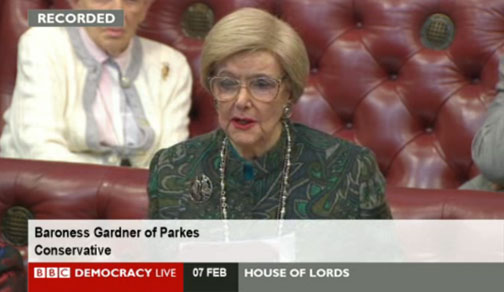The government has no plans to introduce changes to leasehold law, regulated managing agents, enforce a code of practice or even insist that managing agents belong to an ombudsman scheme.
That was the answer on Tuesday in the Lords to Baroness Gardner, who is a former dentist known as Trixie who is from Australia – where iniquitous English leasehold law has long been uprooted.
The government is obviously aware of strong feelings among leaseholders – Baroness Gardner among them.
Although nothing is being done in England or Wales, in Scotland the Property Factors (Scotland) act comes into force in October.
This introduces compulsory registration for managing agents, a code of practice and the threat of a six-months jail sentence for unregistered rogue agents who continue to trade.
In the debate, Lord Shipley asked whether the government should promote “right to manage”, while Lord Best, of the Property Ombudsman, felt it should be obligatory for agents to be members of an ombudsman scheme.
Baroness Hanham, of the Department of Communities and Local Government, disagreed with both proposals.
“I think that most leaseholders need to have a tenants association within their blocks of flats or wherever they live to ensure that they do have some muscle with poor managing agents and that they can then use the routes that are, as I said, there for them,” she said.
The full Hansard exchange is below and members may wish to make their views plain to the peers involved.
Asked By Baroness Gardner of Parkes
- To ask Her Majesty’s Government whether they will introduce regulations or a code of practice to set standards for managing agents for leasehold blocks of flats.
Baroness Gardner of Parkes: My Lords, I beg leave to ask the Question standing in my name on the Order Paper and declare my interest as a leaseholder.
The Parliamentary Under-Secretary of State, Department for Communities and Local Government (Baroness Hanham): My Lords, there are already two codes of practice in force that can be used in evidence in a court or tribunal: the Service Charge Residential Management Code, which is published by the Royal Institution of Chartered Surveyors, and Private Retirement Housing: Code of Practice, which is published by the Association of Retirement Housing Managers. The Government recognise that problems caused by the actions of managing agents can cause leaseholders real inconvenience and distress. Landlords and managing agents must obey the law and should act in a socially responsible manner. While we have no plans for a wide-ranging review of leasehold law, we are keeping a close watching brief and will not rule out making changes.
Baroness Gardner of Parkes: Can the Minister tell me what rights leaseholders have to be assured that managing agents carry out regular assessments of property condition and arrange necessary repairs for works in blocks of flats? Are the agents responsible for ensuring that any work done is carried out to a satisfactory standard?
Baroness Hanham: My Lords, managing agents are employed by the freeholders, although leaseholders have rights as to what they are being charged for and the work that is being done. We believe that any managing agent acting on behalf of a landlord owes a duty of care to leaseholders. Reasonable steps should be taken to ensure that all work is done properly and safely. Leaseholders of course have a right to challenge the management of their blocks and the people who are doing it through the leasehold valuation tribunal.
Lord Best: My Lords, I declare my interest as chairman of the council of The Property Ombudsman, which listens to complaints against managing agents.
Although the Minister is probably against regulation of this sector, does she agree that it would be a good idea if it was compulsory for all managing agents to belong to an ombudsman scheme that can resolve disputes between residents and managing agents without the need to go to court?
Baroness Hanham: My Lords, I do not think that we would want to compel managing agents to do that, but I agree that it would be very helpful if they would voluntarily ensure that they are members of the ombudsman scheme, which is very valuable in terms of leaseholders being sure that they are getting and can get proper access to advice.
Lord Lea of Crondall: My Lords, does the Minister agree that the words “regulation” and “overregulation” should be used with some care, while acknowledging, as the noble Baroness has done, that in practical terms redress through an ombudsman or some other route should be made a lot easier? I speak as having been chair of a residents association of a block of 24 flats over some years. The accounts are almost impenetrable and it is difficult to get stuff done according to the lease. You do not get an answer to the telephone. If you need a plumber, you can use only a named plumber who is never available, et cetera. We all know the litany.
Baroness Hanham: My Lords, I acknowledge that it is probably not very easy, but I do not acknowledge that there are no routes for dissatisfied leaseholders. They have access to the lease valuation tribunal if they have concerns, particularly about charges. They also can go to LEASE if they are concerned about the way in which their property is being managed. It requires at least one person in the property to be in charge of the residents and how they feel in order to make sure that they follow the routes that are already open to them.
Lord Shipley: My Lords, is the Minister aware of the report published last year which showed that some leaseholders were paying far too much in property insurance to managing agents and that, as a consequence, regulation would most certainly help? In addition, might it be for Government to promote the right to manage to leaseholders groups in blocks of flats, so that they themselves can reduce the costs that they have to bear?
Baroness Hanham: My Lords, the matter of commission is already being investigated as there have been many complaints about it. As I understand it, the commission of, for example, insurance would not appear on the service charge but could form another charge that the leaseholders have to pay. I think that most leaseholders need to have a tenants association within their blocks of flats or wherever they live to ensure that they do have some muscle with poor managing agents and that they can then use the routes that are, as I said, there for them.






















